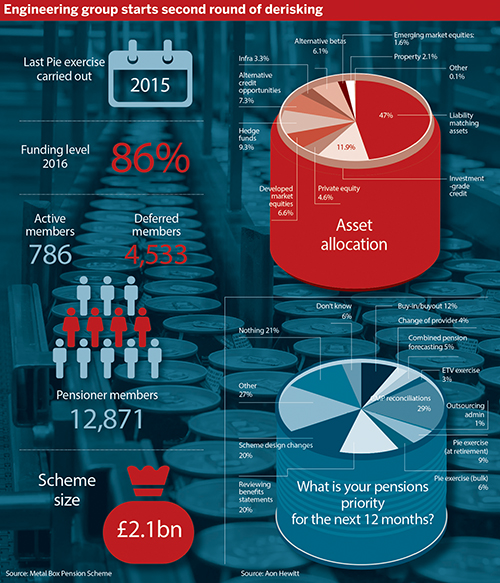The Metal Box Pension Scheme is planning to offer a pension increase exchange to more pensioner members this year, having offered one to some members in 2015.
The Metal Box Pension Scheme is planning to offer a pension increase exchange to more pensioner members this year, having offered one to some members in 2015.
A Pie gives defined benefit members the option of trading their rights to receive annual pension increases in return for a one-off boost to the amount they are receiving as a pension.
But while it can be a cost-effective derisking measure, experts say the success of this exercise all depends on the right communication strategy and appropriate advice.
By taking out increases, pensions are becoming simpler, so members have got more chance of understanding what their pension is likely to be in future
Rob Dales, JLT Employee Benefits
Extending the offer
In the past few years companies including Centrica and Phoenix Group have jumped on board to reap the derisking benefits.

In 2015, CarnaudMetalbox Group, the principal company behind the £2.1bn Metal Box Pension Scheme, ran a Pie offer for some pensioner members. According to the scheme, “around 1,000 pensioners took up the offer after receiving independent financial advice”.
Members have been informed that “there are now plans for the Pie offer to be made to some more pensioner members during 2017”.
There had been a “small improvement” in the funding level arising from the Pie exercise that took place in 2015, the scheme said.
Choice and simplification
Rob Dales, head of corporate consulting at JLT Employee Benefits, said that the main advantage of a Pie exercise for employers is liability reduction.
He said that with a Pie, members “are getting choice to be able to restructure their pension to their personal circumstances”.
And “by taking out increases, pensions are becoming simpler, so members have got more chance of understanding what their pension is likely to be in future, and with greater understanding comes greater appreciation”.
Stuart Price, partner at Quantum Advisory, said Pie offers are generally a cost-effective way of cutting liabilities. Another way to reduce risk in a pension scheme, for example, is to carry out an enhanced transfer value exercise, “but to do that the company’s got to put in big lump sums of money to inflate the transfer values”.
For a Pie however, there is no big upfront cost and all the company needs to pay for is advice from their consultants and actuaries, and communications for members, said Price.
Price explained that a big uplift offered to pensioners generally results in more pensioners taking up the offer, but bigger uplifts also mean the employer makes less of a saving.
“So it’s finding the right balance… between getting enough pensioners taking up the offer, but then also not giving away too much so you still make a significant saving in the scheme,” he said.
“Communication with these types of exercises is key,” he added. He advised schemes to have a graph showing members what their current income is and how it would change as they get older compared with their future retirement income if they were to take up the Pie offer.
What are the pitfalls?
Symon Rowley, director at law firm Pitmans, noted that there are challenges involved, pointing out that a lengthy industry code applies to designing member communications.
Pie generates £23m for Centrica
Utilities provider Centrica has saved £23m on future pension liabilities after a pension increase exchange was taken up by a quarter of retired participants across three of its defined benefit sections.
Rowley also said there are “potential reputational risks if the Pie exercise is not properly run”.
He explained that scams such as pensions liberation have made the Pensions Regulator very wary of exercises that could cause members to lose out.
Phoenix Group opts for second helping of Pie
Phoenix Group’s PGL Pension Scheme has completed a pension increase exchange exercise, but despite only wiping £3m off liabilities, the company says the exercise met pre-implementation expectations.
He said regulator guidance states that trustees should start from the presumption that incentive exercises may not be in most members’ interests.
“Trustees therefore need to act cautiously,” he said. “Member consent is required, and trustees must be seen to act fairly to all members.”
Rowley also pointed out that, although a Pie is an employer-driven exercise, “trustees will need to engage with the employer to ensure members receive full and clear information and give their informed consent”.
He said trustees need to take their own legal advice on the structure of the exercise, and particular issues include age and disability discrimination, data protection, and whether member consent might not be binding on dependants.

















